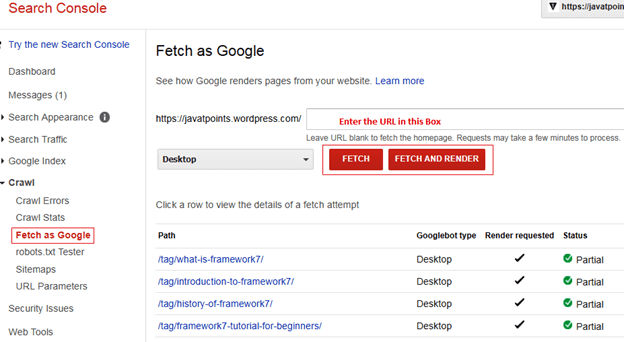Interview :: SEO
A Google penalty refers to the negative impact on the search rankings of a website. It can be automatic or manual, i.e., it may be due to an algorithm update or for using black hat SEO to improve the SEO of a site. If the penalty is manual, Google informs you about it through webmaster tool. However, if the penalty is automatic such as due to the algorithm you may not be informed. Google generally imposes the penalty in three different ways: Bans, Rank Demotion, and Temporary Rank Change.
Google Sitelinks are little sub-listings that generally appear under some search results in a SERP. Google adds Sitelinks only if it thinks they are useful for the user otherwise it will not show any Sitelinks. It uses its automated algorithms to shortlist and display Sitelinks. The four links under flipkart.com, in the image given below, are known as "Sitelinks."
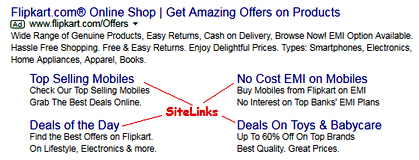
HTTPS, which stands for Hypertext Transfer Protocol Secure), is a protocol for secure communication on the World Wide Web. It uses SSL (Secure Sockets Layer) to add an extra layer of security to the standard HTTP connection, i.e., it is a secure version of HTTP. It encrypts all data or communication between the server and the browser.

The websites which use HTTP protocol, the data is transmitted between the site server and the browser as plain text, so anyone who intercepts your connection can read this data. Earlier, only the websites that handle sensitive data like credit card information were using it, but now almost all sites prefer HTTPS over HTTP. An HTTPS connection provides the following benefits:
- Website Authentication
- Data Integrity
- Data Encryption
Hidden text is one of the oldest black hat SEO techniques to improve the ranking of a site. The hidden text, which is also known as invisible or fake text, is the content that your visitors can't see but the search engine can read or see that content.
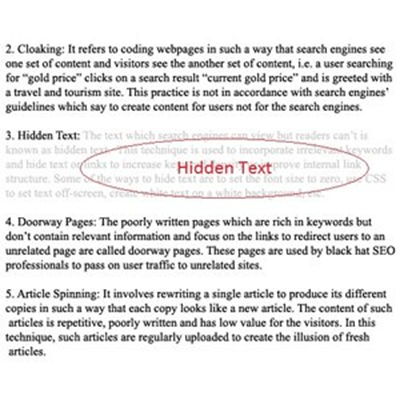
Using hidden text to improve the ranking of a webpage is against the guidelines of search engines. The search engines can detect the hidden text in a webpage and treats it as spam and can ban your site temporarily or permanently. So it should be avoided by the SEOs.
Keyword density refers to the percentage of occurrence of a keyword in a webpage out of all the words on that page. For example, if a keyword appears four times in an article of 100 words, the keyword density would be 4%. It is also known as keyword frequency as it talks about the frequency of occurrence of a keyword in a page. There is no ideal or exact keyword density for better ranking. However, the keyword density of 2 to 4 % is considered suitable for SEO.
Keyword stuffing refers to increasing the keyword density beyond a certain level to achieve higher ranking in the SERPs. As we know, web crawlers analyze keywords to index the web pages, so some SEO practitioners exploit this feature of the search engine by increasing the keywords in a page. This way of improving the ranking is against the guidelines of Google, so it is considered a black hat SEO technique, and it should be avoided.
It is a black hat SEO technique to improve the SEO of a website. In this technique, the SEO practitioners rewrite a single article to produce its multiple copies in such a way that each copy is treated as a new article. These articles have low quality, repetitive content. Such articles are frequently uploaded to the site to create the illusion of fresh articles.
Doorway pages, which are also known as gateway pages, portal pages or entry pages, are created exclusively to improve ranking in the SERPs. They do not contain quality content, relevant information and have a lot of keywords and links. They are created to funnel visitors into the actual, usable or relevant portion of your site. A doorway page acts as a door between the users and your main page. Black hat SEO professionals use doorway pages to improve the ranking of a website for specific search queries or keywords.
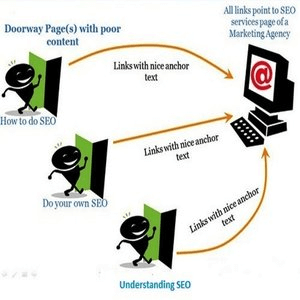
The Disavow tool is a part of Google Search Console that was introduced in October 2012. It enables you to discount the value of a backlink in order to prevent link-based penalties. It also protects the site from bad links that may harm the website's reputation.
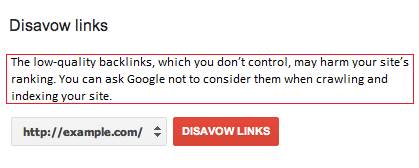
Using this tool, you can tell Google that you don't want certain links to be considered to rank websites. Some sites who buy links may suffer the penalty if they don't get these links removed using Disavow tool. The low-quality backlinks, which you don't control, may harm your site's ranking. You can ask Google not to consider them when crawling and indexing your site.
Fetch as Google is a tool of Google available in the Google webmaster tool. It is used for immediate indexing and to find out the issues with your web pages and website. You can also use it to see how Google crawls or renders a URL on your site. Furthermore, if you found technical errors such as "404 not found" or "500 website is not available", you can simply submit your page or website for a fresh crawl using this tool.
